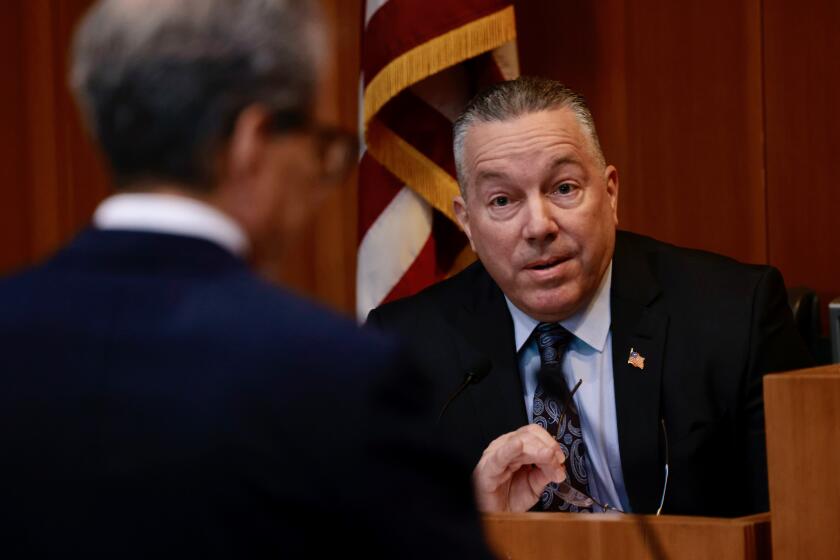Sexual assault investigation policy revised at UC
- Share via
Moving to strengthen its sexual assault policies, the University of California announced new guidelines Friday that require administrators to report more types of violence and harassment and provide more support and protection for victims.
The changes come the same day as a deadline for colleges and universities to comply with revised federal laws aimed at more accurate reporting of statistics for serious crimes in and around campuses, including sexual assault.
The new policy also is an attempt to deal with the enormous pressure many private and public universities are under to address the widespread problem of campus sexual abuse. Current and former students have filed dozens of federal complaints against their schools alleging mishandling of these cases.
The U.S. Department of Education has opened investigations across the country.
The White House has also weighed in. President Obama called on all university and college leaders to develop new approaches to combat the problem. He convened a federal task force, which is due to return with recommendations next month.
“We have no tolerance for sexual violence or harassment of any kind,” UC President Janet Napolitano said in a statement. “The university must, and will, hold itself to the highest standards, and I expect all of our locations to do everything possible to make everyone aware of these standards.”
Under the expanded UC policy victims of sexual violence will be entitled to learn the recommended sanctions that could be imposed on their alleged assailants; they previously could only find out the actual punishment ordered.
Campuses also must also report alleged incidents of sexual harassment, including discrimination based on gender expression or sexual orientation.
The new guidelines also define consent more clearly, and mandate that system employees and students receive sexual harassment and rape prevention training.
Thirty-one current and former UC Berkeley students filed two federal complaints last month alleging that school administrators had mishandled assault investigations. The complaints said that officials for years have discouraged victims from reporting assaults, failed to inform them of their rights and led a biased internal review process that favored the rights of the accused.
On Friday, students said that the policy did not go far enough and that it doesn’t ensure that campus administrators would follow regulations.
“In terms of impacting the culture on campus and changing the way cases are adjudicated, I don’t think it’s going to do much of anything,” said Sofie Karasek, a third-year Berkeley student who was named in the federal complaints.
Under the policy, the system will offer training to those who conduct formal investigations of sexual misconduct. Officials did not say whether that training had been offered previously.
Many of the changes already have been recommended by federal officials in a revision to laws that require administrators to accurately report statistics for serious crimes on campus and nearby, including sexual assaults.
System officials were able to provide few specific examples of how the new policy differs from the previous one.
In a news release, UC administrators said the new policy also provided “specific sanctions and protective measures” that schools could impose on students found responsible for sexual misconduct.
Karasek and others said they were especially disappointed that the policy does not encourage campuses to routinely conduct formal investigations when they learn about reports of sexual assaults.
Berkeley students have complained that administrators have used less rigorous, so-called early resolution investigations — those that are conducted with fewer required interviews and do not produce a finding of facts at the end — when deciding responsibility in sexual assault cases.
In one federal complaint, students said that Berkeley’s Title IX coordinator, Denise Oldham, said officials see more than 500 cases of sexual misconduct every year but “are only able to seek formal disciplinary resolutions in two cases the previous year.”
Oldham has denied making that statement.
“If a survivor wants the option of a formal investigation into a sexual assault case, it should be afforded to them,” said Annie E. Clark, a former University of North Carolina student who had helped more than a dozen groups of students file federal complaints.
The new guidelines encourage campuses to use early resolutions when “parties desire to resolve the situation cooperatively and/or when a formal investigation is not likely to lead to a satisfactory outcome,” according to the new policy.
“Having a formal investigation makes it harder for people to just drop cases,” Karasek said, referring to cases which she believed were too quickly adjudicated.
She also said the new policy does not guarantee victims the right to appeal disciplinary sanctions against their alleged assailants.
UC officials said the policy could be revised in response to public feedback and new federal and potential state laws.
The Campus Sexual Violence Elimination Act was an attempt by the federal government to require colleges to update and expand their policies involving assault and other misconduct. Schools are required to conduct “prompt, fair, and impartial” investigations and change academic or living situations to protect victims, among other things. This was an addition to the 1990 Clery Act, which came in response to a rape and killing on a Pennsylvania campus.
Students across the country have organized to file Clery Act complaints but also have claimed violations to Title IX, the federal anti-discrimination law. Aside from Berkeley, students at Occidental and USC, among others, have filed these allegations.
More to Read
Sign up for Essential California
The most important California stories and recommendations in your inbox every morning.
You may occasionally receive promotional content from the Los Angeles Times.











